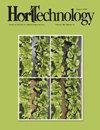黑兵飞草支持植物生长,减少色素生产过程中的氮淋失
IF 1.3
4区 农林科学
Q3 HORTICULTURE
引用次数: 0
摘要
预计工业昆虫饲养作为一种原料将增加,以满足日益增长的全球粮食需求。这将导致被称为草的昆虫排泄物的产量增加,草是一种营养密集的有机物质,有望成为一种天然肥料来源,具有潜在的环境效益。本研究在温室条件下盆栽观赏植物生产过程中,对黑虻(Hermetia illucens)草(BSFF)与合成肥料(SF)进行了比较。将肥料加入以树皮为基础的基质中,分别以0、0.1、0.2或0.3 kg⋅m-3的氮(N)施用,并种植菊花(Plectranthus scutellarioides)。测定生长指数、地上部干重和叶片品质,为期6周。此外,在0.3 kg⋅m-3 N施肥的雏菊和对照雏菊每周收集并分析渗滤液的体积、pH、电导率和养分损失。结果表明,在0.3 kg⋅m-3 N处理下,黑兵飞草可产生可销售的花色植株,与相同施量的SF相比,黑兵飞草可使花色植株的累积N淋失量减少87%。因此,BSFF可以作为一种合适的肥料来源,在不影响生长和叶片质量的同时,潜在地减少养分淋失。本文章由计算机程序翻译,如有差异,请以英文原文为准。
Black Soldier Fly Frass Supports Plant Growth and Reduces Nitrogen Leaching during Coleus Production
Industrial insect rearing is expected to increase as a feedstock to meet growing global food demand. This will lead to greater production of insect excreta known as frass, a nutrient-dense organic material that has shown promise as a natural fertilizer source with potential environmental benefits. In this study, black soldier fly (Hermetia illucens) frass (BSFF) was compared with a synthetic fertilizer (SF) during production of containerized ornamentals grown under greenhouse conditions. Fertilizers were incorporated into a bark-based substrate at 0, 0.1, 0.2, or 0.3 kg⋅m–3 nitrogen (N) planted with coleus (Plectranthus scutellarioides) plugs. Growth index, shoot dry weight, and leaf quality were assessed for a period of 6 weeks. In addition, coleus fertilized at 0.3 kg⋅m–3 N and a control had leachate collected and analyzed weekly for volume, pH, electrical conductivity, and nutrient losses. Black soldier fly frass was found to produce marketable coleus plants at 0.3 kg⋅m–3 N and reduce cumulative N leaching by 87% compared with coleus fertilized with SF at the same rate. Therefore, BSFF can be a suitable fertilizer source for coleus production without compromising growth and leaf quality while potentially decreasing nutrient leaching losses.
求助全文
通过发布文献求助,成功后即可免费获取论文全文。
去求助
来源期刊

Horttechnology
农林科学-园艺
CiteScore
2.30
自引率
10.00%
发文量
67
审稿时长
3 months
期刊介绍:
HortTechnology serves as the primary outreach publication of the American Society for Horticultural Science. Its mission is to provide science-based information to professional horticulturists, practitioners, and educators; promote and encourage an interchange of ideas among scientists, educators, and professionals working in horticulture; and provide an opportunity for peer review of practical horticultural information.
 求助内容:
求助内容: 应助结果提醒方式:
应助结果提醒方式:


